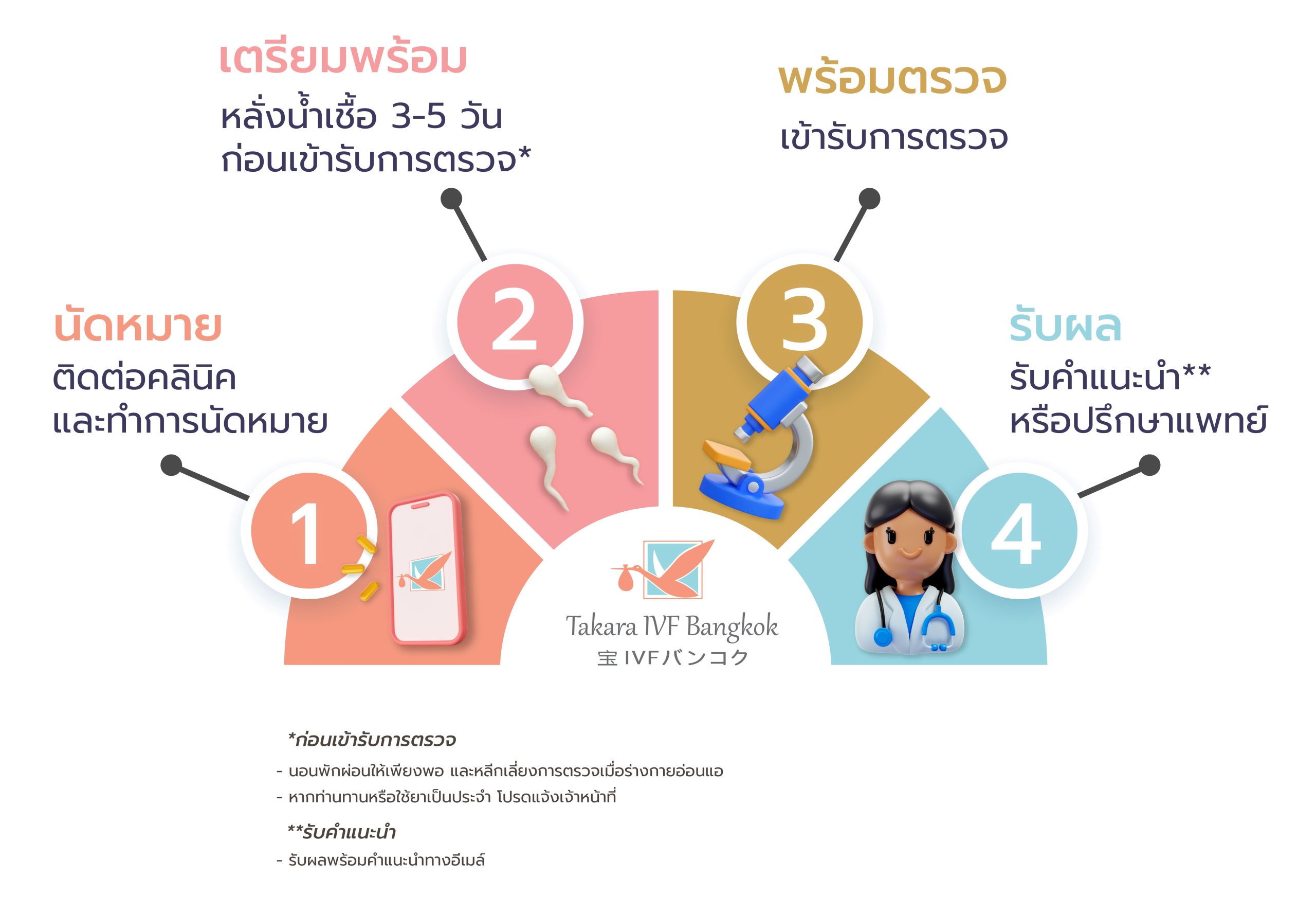FERTILITY CHECKUP
- Home
- Fertility Checkup
What's infertility?
Infertility defined as a failure of conceiving. A couples who are not achieve to pregnancy after having regularly unprotected sexual intercourse for 6 months to 1 year might be diagnosed as infertility. This diagnosis shared by to 15% or around 1 in 6 of couples attempting to conceive.
Cause of infertility
Basically, it is found that about 30%-40% men are infertile, women about 30%-40%, both infertile man and woman about 10% and unidentifiable causes about 10%.
Male:
30%-40% cause of infertility is from male. The factor which impacts to men infertility.
- Lifestyle such as insufficient sleeping, stressful, foods, medication, cigarette and alcohol. Those are effect on quality of sperm.
- Personal disease such as sexually transmitted diseases or abnormality in hormone function have negative effect to sperm.
Female:
30%-40% found that problems in female cause infertility. The cause of infertility in women can be calcified regarding to;
- Age: major factor effect on egg. Usually, the quantity and quality of egg will decrease when the age increase. A peak period to pregnancy for women is in early and mid20s. After that the chance will be decline by the age.
- Lifestyle: Stressful, foods, insufficient sleeping will impact to hormone function which effect to egg growth and ovulation.
- Abnormalities in ovary, fallopian tubes and uterus: Some problems with uterus such as endometriosis, polyp, fibroids might decline ability of implantation. The pelvic adhesion or inflammation might be cause of fallopian tube abnormality which disadvantage to fertilization.
- Personal disease some disease such as thyroid will impact the way the hormone producing organ work.
Fertility check-up
The first step of infertility treatment is evaluation on fertility function both of husband and wife to clarify and determine the suitable treatment. At the beginning, transvaginal ultrasound scan on female and semen analysis on male are performed as a mandatory.
- Male
- Semen analysis
Semen Analysis is a basic but important examination in the assessment of infertility treatment. The test evaluates the quality of sperm follow the standard of WHO by measuring volume, motility and shape of sperm.
For accuracy, the patient should
- Take enough rest and stay healthy. Aviod testing if any illness or weak
- If you are taking any medicines, please inform the staff
- Refrain from semen ejaculation for 3-5 days before having semen analysis.

What’s benefit of semen analysis ?
- To evaluate possibility of fertilization
- To determine the fertility treatment
- To check the sperm condition before start the treatment.
Who’s advised to do semen analysis?
- Male who has been trying concieving for more than 6 months
- Male who has a plan for sperm freezing.
- Male who considers for fertility treatment
- Female
- Transvanal Ultrasound Scan (TVS)
Transvaginal ultrasound scan is performed in order to check the condition of uterus, ovary and growing follicles. Ultrasound scan can detect ovarian cysts, polycystic ovarian syndrome and abnormality of uterus causing a negative impact to pregnancy.
Instruction
Ultrasound scan can be performed on 2nd-3rd day of period to evaluate the antral follicle count (AFC)and on the middle of period to check the ovulation.
What is the benefit of TVS?
- To examine if there is any abnormallity in the uterus , cervix or ovary
- To investigate the cause of infertility, unexplained pain, or abnormal bleeding
- To monitoring the follicles growth
- AMH Hormone Blood test
Anti-Mullerian Hormone, or AMH, is a hormone produced from the ovaries. Doing AMH blood test is to evaluate ovarian function and reserve. It gives us some insight into the remaining quantity of eggs and number of fertile years you may have, but it cannot tell us much about the quality of eegs.
Instruction
- An AMH blood test is able to do any day of the cycle.
- It dosen’t require for fasting.
AMH level
- AMH ≥ 4 ng/ml = high AMH level, a risk of Polycystic ovary syndrome (PCOS)
- AMH 1- 4 ng/ml = Normal range
- AMH 0.3 – 1 ng/ml = Low AMH level, indicate the low egg supply and high risk of infertility
- AMH < 0.3 ng/ml = Low AMH level, indicate the less number of egg and infertility
Who should do the AMH test?
- Female who would like to check her fertility function.
- Female, age lower than 35 years old, who has been trying concieving for more than 1 year
- Female, 35 years old up, who has been trying concieving for more than 6 months
- Female who consider egg freezing or fertility treatment







